Disability History Month: Spotlight on Long COVID
By b.isibor, on 1 December 2023
This blog is co-authored by Disability Equity Lead Dr Elise Crayton and Rikesh Rajani.
As part of Disability History Month this year, I thought it would be meaningful and interesting to shine a spotlight on a newer long-term condition: Long COVID. I am sure, given the media storm that has surround Covid-19 for the past few years we have all heard the term Long COVID but really do any of us know what Long COVID is and what Long COVID can look like and the challenges it presents for those living with it.

long Covid syndrome and coronavirus pandemic symptoms that persist as a burden concept or being tied trapped as a hauler of a virus infection with 3D illustration elements.
What is Long COVID?
Whilst most people who contract COVID-19 recovery fully within a few days or up to 12 weeks later, some do not with symptoms that linger and last much longer. For these individuals, we would consider them to have Long COVID, sometimes described as post COVID-19 syndrome. However, as this condition is new, we are still working to understand it and there are lots of different strands of reach taking place to do this.
If you are looking for more information, the best first resource to access will be the NHS website.
What impact does long COVID have on the UCL community?
There will be many students and staff across campus who are living with Long COVID, whether this is diagnosed or suspected. The symptom profiles from person to person also greatly vary. The most common symptoms include (according to the NHS):
- Fatigue
- Shortness of breath
- Loss of smell
- Muscle aches
However, many people report experiencing other symptoms like: brain fog (issues with memory and concentration), pain or tightening in the chest, heart palpitations, dizziness, insomnia, depression, and anxiety among others. Many people also find that their symptoms get much worse following even small amounts of mental, physical or emotional activity (known as post exertional malaise/post exertional symptom exacerbation).
Therefore, those living with the condition may find usual daily activities on campus challenging such as walking across campus or concentrating in meetings or lectures. Some with Long COVID may also be more susceptible to infection, or feel less confident about mixing in large groups as we did before COVID-19 struck, making many of the vibrant and exciting activities that take place on campus and within academia difficult to engage with.
What can we be doing to support those living with this condition?
There are always positive and easily implementable things we can think of doing to support our colleagues and students with Long COVID. Often these types of changes will not only benefit those with Long COVID but many if not all of the community here at UCL. I do think we need more data and evidence to more robustly understand the types of strategies or interventions we could recommend to help, but I do have a few suggestions that I will present below that I think could have small, but meaningful impact on those with this condition.
-
- Utilise the Reasonable Adjustments/Summary of Reasonable Adjustments (SoRA) schemes within UCL.
a) Line managers and supervisors or personal tutors can support their students and staff to identify some of the person centered approaches to supporting them to study and work successfully on campus via these schemes.
-
- Ask the question: Do all our meetings/social gatherings need to be in person?
a) There are of course many benefits to in person meetings and social gatherings. However, there may be some instances where meetings or social gatherings could take place in a hybrid format (to allow those who find accessing campus harder to stay at home) or even in a remote format, utilising MS Teams or Zoom.
b) To help people with Long COVID avoid reinfection, you could also consider holding social gatherings in a COVID safe manner, such as by having them outside or asking people to do a COVID test beforehand. This can also be helpful for other people living with conditions that increase their clinical vulnerability.
-
- Where appropriate, record meetings, lectures and other presentations or use live captioning
a) Whether a meeting is taking place in person or online, having a meeting recording, captioning or a transcript of a meeting could be vitally important for those who are struggling with concentration or having memory issues. This can also be useful for others though, perhaps those who experience hearing loss and deafness, those with neurodivergence or any one of us who is working in a busy and chaotic environment.
-
- Create and encourage a supportive environment within your team or course.
a) It sounds obvious, but if staff and students feel that they can easily approach others to ask for help if they are experiencing challenges from Long COVID, then it means they are more likely to get the help they need. We may also decrease the chances of students exiting their studies and staff leaving their roles.
b) You can take small, simple steps to do this like:
i) having fortnightly coffee mornings (remote or in person).
ii) having clear, structured processes describing who to contact if you need more support
iii) having clear, structured processes describing who to contact if you need more support
iv) editing your email signature to request that people let you know if they have any needs or adjustments (as it indicates you are open to having these discussions.
v) requesting informal feedback following meetings, lectures or other presentations to sense check whether the format is inclusive
Overall, there are lots of small, simple things we can be doing to ensure that UCL continues to grow and develop into an equitable and inclusive environment. This will have such an important, positive impact on those living with conditions like Long COVID, but in reality will greatly benefit all of us.
Black History Month
By b.isibor, on 3 October 2023
This blog written by Race Equity Lead, Bilal Malik.
Black History Month was first celebrated in the UK in 1987 to honour and commemorate black history and the lives and experiences of the black diaspora living in the UK. It is, however, important to recognise the power and potential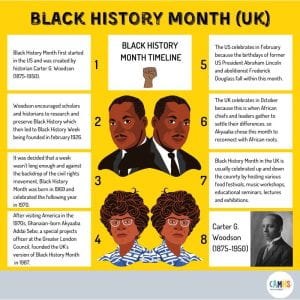 of diversity and remember to challenge inequalities all year round.
of diversity and remember to challenge inequalities all year round.
Race is a social construct, and racism is a learned behaviour. As a child of South Asian heritage growing up in Britain, I wasn’t aware I was any different to my white peers until I was explicitly told so. The concept of colour was alien to an eight-year-old child. This behaviour is learned and can be changed, as can the situation where people who would rather stand than sit on the only empty seat on the bus, next to my brother and me going to school. Some may be applied, but this is nothing to what most black and other ethnic minorities endure. However, learned behaviour can be unlearnt, challenging situations, and education is key.
One way to honour Black History Month is by becoming a better ally. Therefore, questioning assumptions, attitudes, and beliefs and being aware of unconscious bias. It’s not enough to be “not being racist”; you must be anti-racist. So, not being a bystander when racism occurs and confronting discrimination makes us anti-racist. Race is a social construct distinguishable from ethnicity. Social constructs can be deconstructed and reconstructed. Consequently, we can transform race inequality.
The real challenge is structural and institutional racism embedded in the system. We need to understand the lack of opportunity that those from diverse ethnic heritage backgrounds still experience and an appreciation of intersectionality concepts and race as a social construct. There is evidence that racism is embedded in AI and algorithms and AI systems that can produce racist outcomes. We know to dismantle institutional racism, bias, and inequity, we need reforms across policing, criminal justice, healthcare, housing, education, employment, and economic systems. These reforms cannot work unless we all work together without perfunctory tokenistic gestures from those in power. I will leave you with a few words by Kendrick Lamar (the song became an anthem and rallying call for the Black Lives Matter movement and protests).
“Alright”
Song by Kendrick Lamar
“Alls my life I has to fight……..
Wouldn’t you know
We been hurt, been down before,
When our pride was low
Lookin’ at the world like, “Where do we go,?”
And we hate po-po
Wanna kill us dead in the street for sure,
I’m at the preacher’s door
My knees gettin’ weak and my gun might blow
But we gon’ be alright
We gon’ be alright
We gon’ be alright
We gon’ be alright
Do you hear me, do you feel me? We gon’ be alright.
#############################################################
Here are a few links to interesting talks and facts to celebrate the month:
https://www.ted.com/playlists/230/talks_to_celebrate_black_history_month
https://www.blackhistorymonth.org.uk/
https://www.raceequalitymatters.com/black-history-month-2023/
Appointment: EDI Manager
By FBS.EDI, on 26 September 2023
The Faculty has recently appointed Avili Feese (IoO Athena SWAN Project Manager) to the role of EDI Manager, taking over from Ciara Wright, who is shortly leaving UCL.
Avili has worked within EDI in the Faculty since 2019, and has championed a number of EDI initiatives including career support for Professional Services and Technical Staff, and most notably as the driving force behind IoO’s recent Silver Athena SWAN Award.
The Faculty EDI Team looks forward to continuing to address inequalities and create an inclusive culture with Avili’s leadership and support in the coming academic year.
Supporting Inclusivity in Our Communications at FBS
By b.isibor, on 7 September 2023
Sharing pronouns is a small but powerful gesture that can greatly impact how we communicate with and support our colleagues, friends, and acquaintances. Recently, Microsoft Teams introduced a new option for adding pronouns, reflecting the growing awareness of the importance of this practice. Additionally, individuals now incorporate pronouns into their UCL email signatures and social media profiles.
What Does it Mean to Share Your Pronouns?
Sharing pronouns means openly communicating how you would like to be addressed and referred to regarding gender. It’s a simple way to let others know how you identify and how you wish to be recognised. Whether you identify as transgender, non-binary, or cisgender, sharing pronouns is an act of respect and acknowledging the diversity of gender identities.
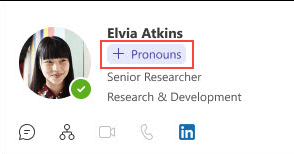
Why Might Someone Choose to Share Pronouns?
Putting pronouns on our email signatures and social media accounts can have a number of benefits:
- Expressing Identity: Trans and non-binary individuals can use shared pronouns to express how they would like to be addressed, ensuring that their gender identity is respected.
- Support and Solidarity: People who feel that their gender identity is already clear to others can use pronouns to show support for trans and non-binary colleagues, promoting an inclusive and affirming environment.
- Clarification: For those whose names do not immediately indicate their gender identity, adding pronouns can help colleagues address them appropriately, reducing potential confusion.
How Should I Use Information About Other People’s Pronouns?
Respecting and using someone’s preferred pronouns is essential. It shows that you acknowledge and validate their identity. However, mistakes can happen, and that’s okay. Correcting these mistakes should be done respectfully. If you make a mistake, apologise briefly and correct yourself without making it a big deal. For example, if someone prefers “they/them” pronouns and you accidentally use “he,” simply say, “I’m sorry, they.”
Do I Have to Add My Own Pronouns?
No. There are also reasons why adding pronouns to our communications might not be appropriate for some colleagues – now or ever.
- Not Ready to Share: Some people might not be ready to disclose their true gender identity to colleagues, and that’s perfectly okay. Respecting their privacy is paramount.
- Undecided Preferences: Others may still be exploring their gender identity or may not have strong preferences. Forcing them to declare pronouns can be stressful and counterproductive.
To sum up, sharing pronouns is a simple yet impactful way to promote inclusivity and respect in our interactions. It allows individuals to express their gender identity, supports their trans and non-binary colleagues, and helps clarify ambiguous situations. Respect and understanding are at the core of this practice, and it’s perfectly acceptable if someone chooses not to share their pronouns for personal reasons. The key is to create an environment where everyone’s gender identity is acknowledged and respected.
Written by Prof Carolyn McGettigan, LGBTQ+ Equity Lead.
Research Funding Calls Are Now Open!
By b.isibor, on 5 September 2023
 To achieve this goal, the fund will support original research work that uses data (new or existing; quantitative or qualitative) to inform hypotheses or wider considerations in the field of EDI work to publish. Projects should address equality, diversity, and inclusion topics related to disability and neurodivergence, LGBTQ+, gender, race and ethnicity, or religion and belief.
To achieve this goal, the fund will support original research work that uses data (new or existing; quantitative or qualitative) to inform hypotheses or wider considerations in the field of EDI work to publish. Projects should address equality, diversity, and inclusion topics related to disability and neurodivergence, LGBTQ+, gender, race and ethnicity, or religion and belief.
All funds must be spent by July 31, 2024, and projects are expected to begin on December 1, 2023. The deadline for applications is October 9, 2023. For further details, please see the attached application form. If you have any questions after reading these materials, please do not hesitate to contact Research Centre Director, Katerina Fotopoulou at a.fotopoulou@ucl.ac.uk.
Find out more about applying, eligibility and assessment criteria for proposals.
Pronouns: New UCL Microsoft Teams Feature!
By b.isibor, on 3 July 2023
The MS Teams platform at UCL now includes a pronoun feature, promoting a more inclusive environment for students and staff. While asking individuals for preferred pronouns is always recommended, this addition is a useful tool, particularly for a widely-used platform among UCL students and staff.
What are pronouns?
According to Central EDI at UCL, pronouns are used to refer to someone or something that is being talked about, for example, “she”, “them”, “this” and “it”.
We use gender pronouns (e.g. “she/her”, “he/him” and “they/them”) to refer to people without using their names. We may assume a person’s gender based on their name, appearance, voice, and/or expression, and “assign” a pronoun, however, this may not always be correct.
Why are Pronouns Important?
Gender pronouns might not seem important to those who have never had to worry about them. However, for people who face frequent gender-related inquiries or are misgendered, it is important to specify or share their pronouns. Feeling left out and isolated can be a very difficult experience to cope with.
Some individuals may relate to genders that differ from the sex they were assigned at birth. Additionally, some individuals may not identify with any particular gender, while others may identify with multiple genders.
How can you Add Pronouns on Microsoft Teams?
 Adding your pronouns on Teams is an easy 3-step process. First, click on your circle image or initials located in the upper right corner. Second, click on your name and email. Finally, select “add pronouns” and add your preferred pronouns accordingly.
Adding your pronouns on Teams is an easy 3-step process. First, click on your circle image or initials located in the upper right corner. Second, click on your name and email. Finally, select “add pronouns” and add your preferred pronouns accordingly.
For a visual demonstration, read the Microsoft instructions.
The EDI Celebration 2023: The Award Winnners!
By b.isibor, on 3 July 2023
The Faculty EDI awards recognises an individual or group whose activities are impassioning, influencing, and leading positive change, making the Faculty of Brain Sciences or the wider UCL community a more inclusive place to work and study. The winners of the EDI Awards were announced at the Faculty of Brain Sciences EDI Celebration 2023. Across the Faculty, 85 individuals were nominated for their outstanding contributions to equality, diversity, and inclusion.
Below are the categories and their respective winners:
- Dean’s Excellence in EDI Award
This award recognises an individual or group that has been a catalyst for change and has generated intentional, sustained, impactful, and/or innovative EDI efforts. Efforts can be related to mentoring, advising, community building, teaching, outreach, research activities, hiring/recruitment, department climate, retention, reducing systemic barriers, developing equitable policies — anything that promotes EDI excellence.
Winner: Natalie Marchant- Division of Psychiatry
Natalie Marchant is a trailblazer promoting equality, diversity, and inclusion within UCL’s Division of Psychiatry. Natalie has founded and led the Race Equity and Ethnic Diversity group and chairs the EDI committee. Natalie has initiated innovative projects such as the creation of Divisional In2Science internships and name-blind recruitment for research Grade 6b posts and has created working groups to deliver on these, inspiring her team and supporting junior colleagues. Her values and behaviours have resulted in positive change towards a more inclusive environment.
2. Contribution to EDI in Leadership Award
This award recognises an individual or group whose activities are impassioning, influencing, and leading positive change, making the Faculty of Brain Sciences and the wider UCL community a more inclusive place to work and study.
Winner: Stefanie Anyadi- Division of Psychology and Language Sciences 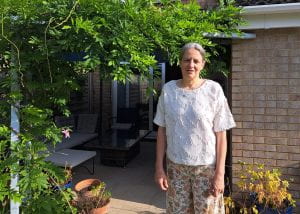
Stefanie’s leadership in actively promoting diversity and challenging implicit bias through her Caleidoscope project has been successful. Stefanie’s commitment to this important project has remained steadfast despite challenges brought on by the pandemic. Through her workshops and training methods, Stefanie has shared her vision and inspired the wider UCL community and abroad at Utrecht University in the Netherlands.
3. Contribution to EDI in Education and Student Experience Award
This award recognises an individual or group that has developed innovative teaching, learning, and/or assessment practices or other initiatives that advance inclusive education for diverse students and contribute positively to the student experience.
Winner: Tim Young, Tracy Skinner, Jessica Jiang, Benito Maffei, E’Jane (Yi Jie Li), Kangxin Chen Huang, and Mena Farag- Institute of Neurology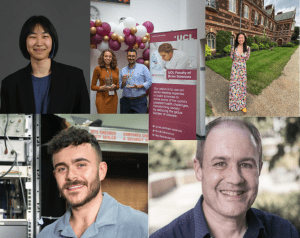
This group comprises active Institute of Neurology (IoN) EDI Action Group members, representing all student categories. They have made significant contributions by conducting the IoN student survey on wellbeing, mental health, and career development, organising ‘Paths to PhD’ events, and providing Active Bystander training for students. These initiatives have positively influenced the progress of EDI across different demographics and increased engagement to promote EDI.
5. Contribution to EDI in Research Award
This award recognises a person who has taken the opportunity to engage with staff, speaking openly about their personal experiences in a visible forum that encourages and champions diversity and inclusion in a way that new and existing staff can relate to.
Audrey Zhang- Division of Psychology and Language Sciences
Audrey conducted a research project exploring the ‘Effects of Personal and Contextual Factors on Status and Belongingness of First-year Undergraduate Students.’ Audrey administered questionnaires to Psychology students three times and found that mental wellbeing, extraversion, and openness positively contribute to their sense of belonging. Audrey’s research provides useful information for university administrators to improve student success and promote EDI.
- Contribution to EDI in International Community Award
This award recognises an individual or group that regularly goes above and beyond, making a positive difference to the embodying its ever-growing international community through celebrating culture and/or creating and contributing towards innovative projects and activities that enhance the experience of UCL’s international community.
Winner: Angela Hwang- Institute of Neurology
Angela founded the first epilepsy genomics project in the Democratic Republic of Congo, focusing on analysing the genomes of diverse groups of people with epilepsy. Angela’s research aims to compare the genetic architecture of epilepsy in African populations, particularly in resource-limited settings. Angela’s work has earned her the NIHR pre-doctoral fellowship in 2022 and is a testament to her remarkable drive and passion for improving healthcare.
6. Contribution to EDI in Innovation and Enterprise Award
This award recognises an individual or group who has significantly contributed to EDI using innovation and enterprise activities that led to an inclusive and equitable impact for students and/or staff at FBS and beyond.
Winner: Georgia Pavlopoulou, Irina Nedelcu, and Ruth Moyse- Division of Psychology and Language Sciences.
Georgia, Irina, and Ruth developed new training curricula to address the wellbeing of autistic people through enhanced access to mental health support and recovery plans. The program’s success in England and the South-East has led to a national roll-out funded by NHS England for all ages in various settings. It’s a remarkable and inclusive training module with key topics around neurodiversity and its impact on the workplace and post-graduate courses.
Brain Sciences Celebrates EDI Achievements
By b.isibor, on 3 July 2023
The EDI Celebration Awards 2023 event aimed to recognise individuals who are contributing to equality, equity, diversity, and inclusion at Faculty of Brain Sciences and beyond. The event celebrated the achievements of approximately 85 nominated individuals across the Faculty. 
The awards ceremony began with an opening speech by Professor Anna Cox, who serves as the Vice Dean for EDI. Anna emphasised the significance of EDI in the learning and work environments and the importance of celebrating success as progress is made. Leadership plays a crucial role in achieving this success, leading to the presentation of the first award category, ‘Contribution to EDI in Leadership.’ The winner was Stefanie Anyadi, who has actively led a project to promote diversity and challenge implicit bias through their Caleidoscope project. Through their workshops and training methods, they have successfully shared their vision and inspired the wider UCL community and abroad at Utrecht University in the Netherlands.
Next, Dr Steven Bloch, the Vice Dean for Education, briefly spoke about the significance of inclusive practices in education and how they benefit the learning environment at UCL. He then presented the award for ‘Contribution to EDI in Education and Student Experience.’ The winner was the Institute of Neurology (IoN) EDI Action Group, including Tim Young, Tracy Skinner, Jessica Jiang, Benito Maffei, E’Jane (Yi Jie Li), Kangxin Chen Huang, and Mena Farag who have made significant contributions by conducting the IoN student survey on wellbeing, mental health, and career development, organising ‘Paths to PhD’ events, and providing Active Bystander training for students.
 Professor Courtenay Norbury, the Vice Dean for Research, then recognised the work of researchers across the Faculty and specifically praised the establishment of the Centre for Equality Research in Brain Sciences. Courtenay then presented the award category ‘Contribution to EDI in Research.’ The winner of this category was Audrey Zhang for conducting a research project that explored the ‘Effects of Personal and Contextual Factors on Status and Belongingness of First-year Undergraduate Students.’
Professor Courtenay Norbury, the Vice Dean for Research, then recognised the work of researchers across the Faculty and specifically praised the establishment of the Centre for Equality Research in Brain Sciences. Courtenay then presented the award category ‘Contribution to EDI in Research.’ The winner of this category was Audrey Zhang for conducting a research project that explored the ‘Effects of Personal and Contextual Factors on Status and Belongingness of First-year Undergraduate Students.’
After the Contribution to EDI Research award, Professor Lasana Harris, who serves as the Vice Dean for International, proceeded to present the award for ‘Contribution to EDI in the International Community’. to celebrate the substantial contributions of EDI in the global scene at Brain Sciences. This category was awarded to Angela Hwang, who founded the first epilepsy genomics project in the Democratic Republic of Congo, focusing on analysing the genomes of diverse groups of people with epilepsy.
Dr Joseph Delvin, former Vice Dean for Innovation and Enterprise, presented the award category ‘Contribution to EDI in Innovation and Enterprise.’ He emphasised that innovation and enterprise are crucial in achieving the Faculty’s vision for solving brain science’s greatest health and wellbeing challenges. The category was won by Georgia Pavalopoulou, Irina Nedelcu, and Ruth Moyse, who led the development of the new training curricula to address the wellbeing of autistic people through enhanced access to mental health support and recovery plans as a part of a national rollout in England and the Southeast.
Lastly, Professor Alan Thompson, the Faculty Dean, announced the Dean’s Excellence in EDI award winner, Natalie Marchant. Natalie was recognized for her exceptional leadership and involvement in promoting EDI initiatives and practices in the Division of Psychiatry. She initiated various projects, including the Divisional In2Science internships, name-blind recruitment for research Grade 6b posts, and founded and led the Race Equity and Ethnic Diversity group.
Alan wrapped up the ceremony by recognising the astounding accomplishments in advancing EDI across the Faculty. He highlighted the achievements of five departments with Athena SWAN Silver awards and one with Bronze, as well as the key departmental staff that included Directors of EDI, Inclusion Leads, Athena SWAN Chairs, and EDI Professional Services staff within each department. Additionally, he acknowledged the EDI Faculty staff team, including the Vice Dean EDI, EDI manager and coordinator, 5 Equity Leads, Equality research centre director, and BAME awarding gap lead, who provides guidance and supervision to Faculty-level EDI work. Alan pointed out that there is still much work to be done within the Faculty to address inequalities related to protected characteristic groups and achieve the prestigious Athena SWAN Gold awards as a measure of excellence. However, the prioritized investment in resources and the commitment of individuals and teams throughout the Faculty indicate positive progress in the right direction.
The post-event gathering was heartwarming as people interacted over delicious food and drinks to celebrate the accomplishments of nominees, finalists, and winners. The Faculty takes pride in staff and students involved in EDI for their unwavering dedication to promoting EDI and upholding good practices. Keep up the exceptional work!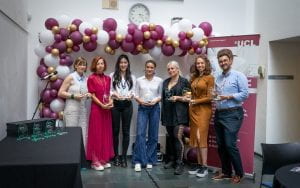
The ERB Centre: BAME students on Speech and Language therapy Training Programme.
By b.isibor, on 30 May 2023
The ERB Centre, also known as the Centre for Equality Research in Brain Sciences, offers funding and opportunities for research that promote equality, diversity, and inclusion.
Authors, Christina Smith and Rachel Reeves conducted a research project on exploring students’ experiences from Black, Asian and minority ethnic (BAME) backgrounds on a pre-registration speech and language therapy training programme.
They discovered, previous research with students from BAME backgrounds on physiotherapy training programmes identified themes that included: feeling like an outsider, lack of understanding of cultural and ethnic differences and lack of power and influence. The speech and language therapy profession has even fewer members from BAME backgrounds. Therefore, this study will aim to discover whether similar or different themes arise with speech and language therapy students.
All students on the MSc Speech and Language Sciences programme (approximately 120 students) were invited to participate in an online focus group if they identify themselves as being from a BAME background. Christina and Rachel recruited a research assistant not associated with the programme, to run the focus group with ten students, using a topic guide developed from the literature.
The Zoom platform was used to record the group conversation during the focus group. This will enable the generated high quality transcript automatically. The research assistant (supervised by the applicants) conducted an analysis on the transcript and took the lead in writing the report.
Ethical guidelines were followed. The student volunteers were asked for consent after being provided with the relevant information. Only the research assistant knew the names of the participants and, during the focus group, they instructed the participants not to use each other’s names. The recording was deleted once the anonymised transcription was completed.
Themes arising from the analysis indicate issues to be addressed on the programme and other programmes for health professionals at UCL and other higher education institutes.
To keep up with the latest news from The Centre for Equality Research in Brain Sciences (the ERB Centre), kindly visit their website. In case of any inquiries, feel free to reach out to fbs.edi@ucl.ac.uk via email.
FBS EDI Awards 2023: The Shortlist
By b.isibor, on 30 May 2023
The Faculty of Brain Sciences EDI Celebration aims to acknowledge and appreciate the exceptional work and contributions made by both staff and students toward promoting and impacting EDI over the past few years.
With six distinct award categories covering various areas of the Faculty, there is a wide range of opportunities for staff and students to be nominated and recognised.
This year, we received a total of twenty-four nominations across all categories.
Our panel of EDI Staff has shortlisted three individuals or groups for each category, from which a winner will be selected by the Faculty Dean and Vice Deans. The award winners will be announced during our EDI Celebrations scheduled for Monday, June 19th, 2023.
We are thrilled to share the exceptional staff and students who have been shortlisted for the awards:
Dean’s Excellence in EDI Award
- Natalie Marchant- Division of Psychiatry.
- Diana Sefic-Svara- Insititute of Ophthalmology.
- John Draper- Division of Psychology and Language Sciences.
Contribution to EDI in Education and Student Experience
- Tim Young; Tracy Skinner; Jessica Jiang; Benito Maffei; E’Jane (Yi Jie Li); Kangxin Chen Huang; Mena Farag- Institute of Neurology.
- Michael Foster- Institute of Neurology
- Vitor Zimmerer- Division of Psychology and Language Sciences.
Contribution to EDI in Leadership
- Stefanie Anyadi- Division of Psychology and Language Sciences.
- Benjamin O’Callaghan- Institute of Neurology
- Wing-Chau Tung- Insititute of Ophthalmology.
Contribution to EDI in Research
- Katerina Fotopoulou- Division of Psychology and Language Sciences.
- Leslie Gutman; Fatima Younas; and Rachel Perowne- Division of Psychology and Language Sciences.
- Audrey Zhang- Division of Psychology and Language Sciences.
Contribution to EDI in International Community
- Anouchka Sterling- Division of Psychiatry.
- Sushrut Jadhav- Division of Psychology and Language Sciences.
- Angela Hwang- Institute of Neurology
Contribution to EDI in Innovation and Enterprise
- Georgia Pavlopoulou and National Autism Trainer Programme Team- Division of Psychology and Language Sciences.
Congratulations, and good luck to all this year’s nominees!
Please note that name spellings were provided by those who were nominated. If any corrections are required, please contact fbs.edi@ucl.ac.uk.
 Close
Close

